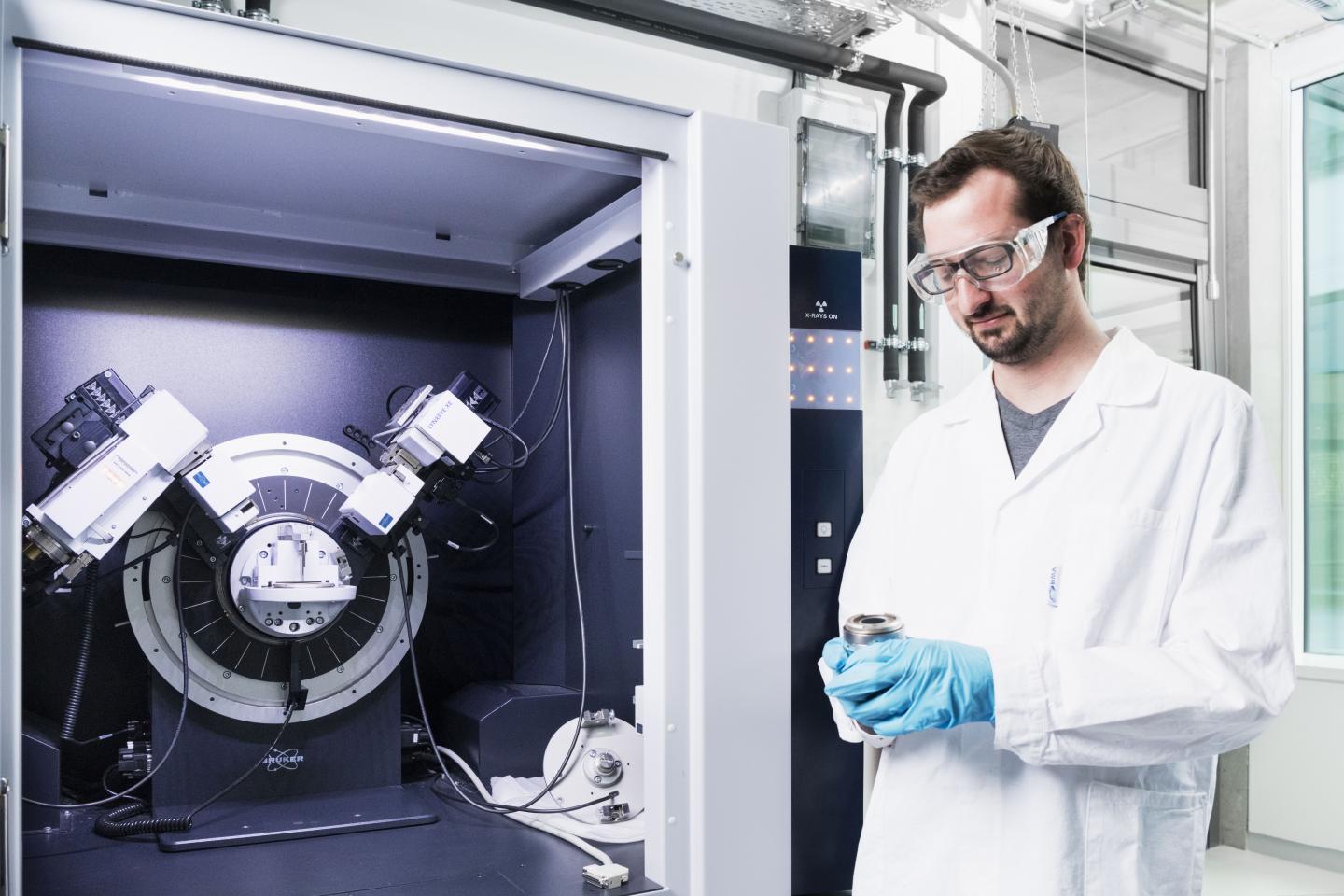European Initiative BATTERY 2030+ brings together leading science institutions – one of the partners is the CELEST Research Platform of KIT, Ulm University, and ZSW

Credit: Photo: Amadeus Bramsiepe, KIT
To successfully implement the energy transition and to store regenerative energy, better batteries are required. The European research initiative BATTERY 2030+ brings together leading scientists and companies from all over Europe to achieve major progress in battery science and technology. It is scheduled for a duration of ten years. The preparation project for BATTERY 2030+ will start in March. Karlsruhe Institute of Technology (KIT) is a partner of this consortium.
The aim of BATTERY 2030+ is to develop more powerful batteries and cutting-edge technology for European industry. Batteries are crucial to the sustainable storage of energy from renewable sources and, hence, to reducing carbon dioxide emissions. In future, new generations of extremely powerful, reliable, safe, sustainable, and inexpensive batteries will be required. Apart from KIT, five European universities and eight research centers are involved in the consortium of BATTERY 2030+. “We will contribute to all central topics, in particular to accelerated development of materials,” says Professor Maximilian Fichtner, Head of the Energy Storage Systems Group of KIT’s Institute of Nanotechnology. The chemist also is Deputy Director of the Helmholtz Institute Ulm and Scientific Director of the Center for Electrochemical Energy Storage Ulm & Karlsruhe (CELEST for short). CELEST pools the know-how of 29 institutes of KIT, Ulm University, and the Center for Solar Energy and Hydrogen Research Baden-Württemberg (ZSW). It is the biggest research platform in the area of electrochemical energy storage in Germany.
“BATTERY 2030+ is about changing the way we have done research and development, for example by including Artificial Intelligence (AI).” Fichtner points out. AI-based data evaluation of a large number of samples produced by robots might reveal the behavior of certain materials and answer the question of how a material has to be structured to exhibit certain properties. “By pooling European expertise in these areas, we have the chance to be among the world’s leaders in battery development and to be competitive with groups in the USA and Asia,” Fichtner adds. He also coordinates the Cluster of Excellence “Post Lithium Storage” (POLiS) acquired by KIT and Ulm University within the Excellence Strategy launched by the federal government and the federal states.
The BATTERY 2030+ research initiative is coordinated by Kristina Edström, Professor of Inorganic Chemistry at Uppsala University in Sweden. “With BATTERY 2030+, we address all challenges encountered in the manufacture of high-performance batteries,” the scientist says. “For this purpose, we will establish a platform to more rapidly detect new battery materials by means of machine learning and artificial intelligence. We are particularly interested in the interfaces in batteries, where reactions take place that adversely affect the battery’s service life. We will design smart functions of the complete system down to the battery cell level and pay particular attention to sustainability,” Edström adds. “The duration of ten years of the BATTERY 2030+ initiative gives the partners the planning security needed in science when shaking at the foundations of the process,” Maximilian Fichtner emphasizes.
###
About the BATTERY 2030+ Consortium
Apart from Karlsruhe Institute of Technology, five universities are partners of the BATTERY 2030+ consortium: Uppsala University, Po-lytechnical Institute of Torino, the Technical University of Denmark, the Free University of Amsterdam, and the University of Münster. In addition, several research centers have joined the consortium, namely, the French Research Center for Alternative Energies and Nuclear Energy CEA, the French National Center for Scientific Research CNRS, Forschungszentrum Jülich, Fraunhofer Society, Fundacion Cidetec, the National Institute for Chemistry of Slowenia, and the Organization for Applied and Technical Research of Norway. In addition, the renowned industry associations of EMIRI, EASE, and RECHARGE, as well as the company Absiskey are consortium partners. The consortium is supported by official European and international bodies, among others by ALISTORE ERI, EERA, EIT InnoEnergy, EIT RawMaterials, EARPA, EUROBAT, EGVI, CLEPA, EUCAR, KLIB, RS2E, the Swedish Center for Electric Mobility, PolStorEn, ENEA, CIC energigune, IMEC, and the Tyndall National Institute.
For more information on BATTERY 2030+: http://battery2030.
Press contact:
Dr. Martin Heidelberger
Press Officer
Phone: +49 721 608-21169
Email: [email protected]
Being “The Research University in the Helmholtz Association,” KIT creates and imparts knowledge for the society and the environment. It is the objective to make significant contributions to the global challenges in the fields of energy, mobility and information. For this, about 9,300 employees cooperate in a broad range of disciplines in natural sciences, engineering sciences, economics, and the humanities and social sciences. KIT prepares its 25,100 students for responsible tasks in society, industry, and science by offering research-based study programs. Innovation efforts at KIT build a bridge between important scientific findings and their application for the benefit of society, economic prosperity, and the preservation of our natural basis of life.
This press release is available on the internet at http://www.
Media Contact
Monika Landgraf
[email protected]
Original Source
https:/




